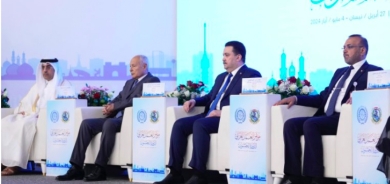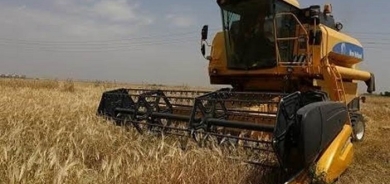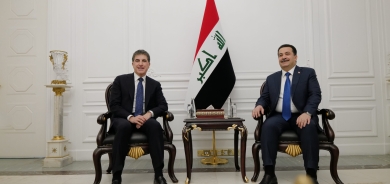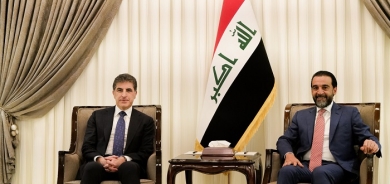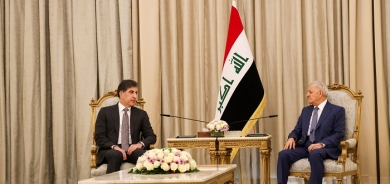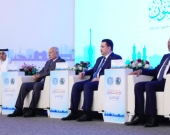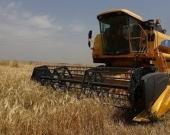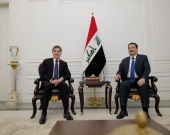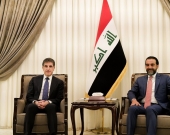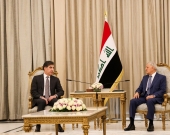ICRC chief visits Syria to gain access to detainees, expand aid as violence continues
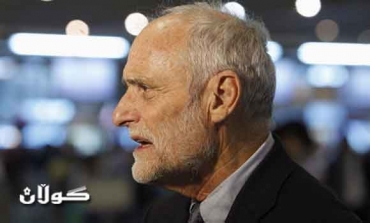
Jakob Kellenberger, who will be in Syria until Wednesday, will push the ICRC’s proposal made in February for a daily two-hour ceasefire to evacuate wounded and deliver life-saving supplies to civilians.
“I am determined to see the ICRC and the Syrian Arab Red Crescent expand their presence, range and scope of activities to address the needs of vulnerable people,” he said in a statement. “This will be a key element of my talks with the Syrian officials.”
Syrian government forces bombarded opposition targets in the city of Homs on Monday despite President Bashar al-Assad’s promise to international peace envoy Kofi Annan to cease fire and withdraw his tanks and artillery.
Kellenberger, making his third trip to Syria since June, is to hold talks with senior officials, including Foreign Minister Walid al-Muallem, Interior Minister Major-General Mohammed al-Shaar and Health Minister Dr. Wael al-Halki, according to Reuters.
He is due to visit areas affected by the fighting, including the rural area of the southern city of Deraa, accompanied by ICRC and Syrian Red Crescent officials.
“On Wednesday, Mr. Kellenberger will go to Deraa where there may be a distribution of humanitarian aid,” ICRC spokesman in Damascus Saleh Dabbakeh said, according to AFP.
Seeking access to detention centers
The ICRC is the only international agency to deploy aid workers in Syria, where the United Nations has been largely shut out and is still trying to gain meaningful access to the needy.
After Kellenberger’s talks with Assad in September, Syria opened its prisons for the first time to the ICRC whose officials visited detainees in the central prison of Damascus.
But visits have since stalled, with the ICRC insisting that its traditional terms, which include the right to interview prisoners in private and make follow-up visits, be respected.
Kellenberger will seek access to detention centers as well as examine “practical measures for implementing our initiative for a daily two-hour cessation of fighting,” his statement said, according to AFP.
More than 18,000 people were detained in Syria as of Feb. 15 in connection with the uprising, U.N. human rights investigators said in a report issued that month that accused top Syrian officials of ordering crimes against humanity including murder and torture.
U.N. High Commissioner for Human Rights Navi Pillay said last week that children in detention were being tortured. Youth had been shot in the knees, denied medical treatment for injuries and held together with adults in inhumane conditions.
“I will be raising the issue of access to all places of detention. Visiting people who have been detained remains a priority for us,” Kellenberger said in Monday’s statement.
“I will also further discuss practical measures for implementing our initiative for a daily two-hour cessation of fighting. A daily pause in the hostilities is essential in order to evacuate wounded people and deliver aid if and when the fighting intensifies,” he said.
The ICRC said that in recent weeks it had obtained greater access to many areas affected by the fighting and is now able to stay longer in each place to assess needs.
More than 9,000 people have been killed by Assad’s forces during the year-old revolt, according to the United Nations, while Damascus says 3,000 soldiers and police have been killed.
The ICRC has been central in pushing for a daily humanitarian truce, with Kellenberger travelling to Moscow to get Russia, a key Syria ally, to back the idea.
Kellenberger also visited the United States last week where he discussed the situation in Syria with U..S Secretary of State Hillary Clinton.
Syrian forces pound rebel bastions
At least 65 people were killed Monday as Syrian forces pounded rebel bastions and clashed with insurgents near the Turkish border, monitors said.
The Syrian Observatory for Human Rights also charged that the army was torching and looting rebel houses across the country in a deliberate campaign that could amount to crimes against humanity.
Government troops have also carried out theft and looting, as “a kind of collective punishment, which could amount to crimes against humanity.”
The official SANA news agency, meanwhile, said the authorities had foiled an attempt by “terrorists” to cross the border from Turkey, adding that one was killed and the others fled.
Bombings have hit Syria’s major cities in recent months, provoking mounting concern that al-Qaeda has taken advantage of the uprising against Assad.
In Damascus, a blast ripped through the city center near a hotel and a police station, injuring some people and damaging shops, official Syrian television al-Ikhbariya and witnesses said.
“A bomb exploded loudly near the Hotel Kinda” in busy Marja neighborhood in the center of the capital, the television channel said.
“Four people were slightly hurt and shops damaged.”
Witnesses said the explosion occurred near a police station, and that the area had been cordoned off, with ambulances seen at the site of the blast.
The latest violence comes a day after Western and Arab nations called for Assad to be given a deadline to meet the terms of a peace plan crafted by U.N.-Arab League envoy Kofi Annan.
AL ARABIYA

